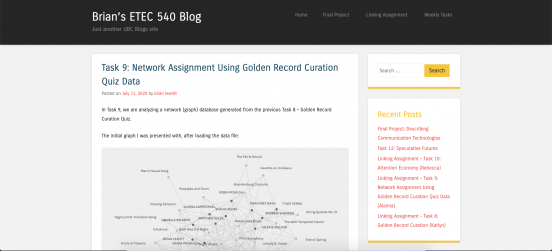I've really enjoyed the blog space approach in this course. Completing a weekly task is only half the fun. The rest comes from browsing through and engaging with other people's posts. The variety in our approaches and thoughts on the same assignment never fails to amaze and intrigue me, and I always close each window with my mind spinning with new ideas. For my linking assignment, I have selected posts that I found myself thinking about long after reading and commenting on them.
Link 5
For my fifth link, I went back to Brian Leavitt’s Week 9 post on networks and algorithms. The original can be viewed below.
Task 9: Network Assignment Using Golden Record Curation Quiz Data
I’ve enjoyed reading over Brian’s blogs each week. His site is easy to navigate, and he always says things that show me a new perspective and make me reflect on my thoughts on a topic. Comments were also always replied to, which means my questions and curiosities were answered and encouraged. His work is pleasant to read, and he integrates personal perspective and formal theory seamlessly into the same posts. This makes his writing feel both authentic and academically valid, which is a difficult balance to achieve but always enjoyable to consume when it does!
This linking assignment circles back to Brian’s Task 9 on Networking using the golden record quiz data. In Brian’s blog, there was one statement that stood out to me like a lighthouse on a foggy night:
Their usefulness depends on manipulation, interpretation, and analysis – all things that both create meaning and change meaning.
I felt like this was such an important statement, that can really be woven into every week of this 540 course so far. Texts and technologies all revolve around this: manipulation, interpretation, and analysis. Without those human tendencies, I doubt text and tech would be permeating our lives to the extents that it does. That said, it even makes me reflect on the fact that technologies and texts – once manipulated, interpreted, and analysed – often begin to shape culture and humans in return.
On an academic level, Brian’s statement made me think back to Latour’s (2004) Parliament of Things. This piece is a call for a non-modern reconstruction of how we conceive natural, social, and technological phenomena to see them as interconnected rather than separate. Discourse, Latour motivates, should situate objects as hybrids that are a result of complex interactions between people, concepts, and systems. It is within this space that an analysis of algorithms as more than a technological object is valid, giving us insight into how it both represents and mediates the social systems it is borne of and situated in instead.
On a personal note, Brian reflected another thought that resonated deeply with me and was something that I brought up in my own blog on this task. When people are grouped by algorithms, there is no choice. The assumptions of importance by the algorithm creator are rarely questioned, and are taken as unbiased fact. What does this do to people who are grouped in a way that they would strongly disagree with if they knew why they were grouped in the way they were? Grouping by algorithm also tends to subtly reinforce sameness over time. If your life is shaped by algorithms that push people with similar likes, interests, thoughts, and opinions together, an important part of society is changed. Opinions are reinforced and made more extreme, instead of tempered and reexamined. Exposure to new experiences, cultures, and contexts are slowly limited. A large part of this issue is that most people do not understand how algorithms work, even if they are aware that they are at play in the daily technologies and systems they interact with. Algorithms also tend to be proprietary and secret – they are often used to generate vast wealth, and so are well-guarded intellectual property. If we do not want to cede control of our lives to the unknown motives and biases of those who create and utilize these algorithms, they must be made public and open-source.
References
Latour, B. (2004). From Realpolitik to Dingpolitik – An Introduction to Making Things Public [Online catalogue article]. Retrieved from http://www.bruno-latour.fr/node/208.html
McLuhan. (1977). Laws of the Media. Et cetera 34(1), 173-178.
